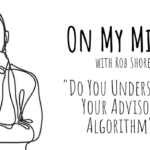In our recent 2017 State of Wholesaling Survey we asked:
What areas of improvement would benefit you most over the next three years?
The wholesalers surveyed said:
Our partners in Wholesaler Masterminds Schedulers have insights to share about how wholesalers can greatly improve their follow-up process.
Chris Dungworth is the Managing Partner at Ro Morrison and Associates, a concierge speakers bureau for the financial services industry, and has over 15 years of experience in the Financial Services Industry.
He can’t stand the thought of wholesalers engaging a speaker who over-promises, under-delivers and jeopardize the success and return on investment of a conference or roadshow. It drives him crazy when a wholesaler brings in a speaker and there is no focus on what should happen after the event.
He believes speakers need to focus on key takeaways and actionable strategies, and that the success of any event is determined by the pre- and post aspects of the event, not just the event itself.
The Art & Science of the Follow-up
The follow-up process is the science of what you do before the meeting or the event takes place. The art is in how you deliver the message during and after the meeting/event. While everyone wants to focus on the follow-up right away, the most successful wholesalers know that the time spent preparing the event will deliver the strongest ROI.
The one thing to remember about a great follow-up process is that it is always about the advisor and never about you, the wholesaler. You always want to be following up with something that is relevant to them, and this then gives you permission to ask questions or do something that is then relevant to you.
For any event (conference, breakout session, one on one meeting, lunch meeting, etc.) there are always three things to be thinking about that will set the follow-up process in motion.
Advisor Behavioral Change or Reinforcement
- What behavioral change do you need the advisor to make to start writing business with you?
- Why should the advisor stop writing business with another wholesaler and start writing business with you?
- How do you continue to reinforce the advisor’s behavior to continue to write business with you?
What Action needs to be Taken Post-Event?
- What do you want the advisor to do?
- What are you going to do?
What is the Value You are Delivering?
- For every meeting and every event, you need to be delivering value.
As you think about your next meeting or event, make sure you think about how you can answer the questions from above.
Let’s look at an example of partnering with a speaker for a roadshow or conference and how the follow-up process works
- Bringing in the right speaker
- A great call to action
- Wholesaler training
The Right Speaker
There is no substitute for a great speaker. This does not mean you need to spend outside of your budget. It just means you need to find the right speaker for your event who will partner with you to support and elevate your brand.
A Great Call to Action
There are three core rules that I use to define a strong call-to-action that will impact your ability to follow-up with the advisor.
- The deliverable has to be something tangible – you need to be able to touch it physically. You need to be able to hand it to an advisor or email it in some instances.
- It has to be something of value that the advisor wants.
- It has to be immediately actionable for the advisor – We believe that a Quick Reference Guide (QRG) has more value than a book.
While the science is making sure you have a strong call-to-action, the art is knowing how to position your call-to-action or as I call it the ethical bribe. The idea behind the ethical bribe is that it is set up by the speaker during the presentation. The speaker will showcase the deliverable and then let the advisors know the only way to receive a copy is to meet with you.
The entire purpose around the ethical bribe is to help you get more post-event one-on-one meetings. Once in the meeting, you can then, at the right time, talk about the things you want to talk about to drive sales.
Wholesaler Training
Wholesaler training and the call to action go together in many ways. It is important to understand the presentation, the call to action, how to introduce the speaker, and much more.
Here are a few points that make a big difference
- Get to know the speaker. This will filter throughout everything touch point with the advisors.
- Fully understand the presentation. You should never be hearing the presentation for the first time when the advisor is hearing it for the first time.
- Understand all the deliverables. Know the call to action.
- Make sure your internal wholesaler is also fully involved. Too many times we forget about the internal. The internal is an important part of the pre and post-event process.
Your Follow-up Meeting
Those advisors who were not ready to meet with you before, now are because they appreciated you inviting them to an event where it was all about them and their business. There was no product talk and you were not trying to sell them anything. You have created a legitimate reason to follow up with the advisor that is about them and not about you.
In the past we have seen wholesalers walk into the advisor’s office, deliver a handout and then start to talk about themselves. This is not what you want to do. You want to continue to add value, and this is where the art of the process comes into play. You want to do the following three things:
- Start the conversation about the speaker and his or her presentation.
- Deliver them the handout and mention a couple of points that struck you as being particularity valuable.
- See if there is anything you can help them with that connects this training to grow their business.
This will gain you more traction than talking about a product. Once you have shown them you care about their business, they will show you they care about yours.
If you are looking for a great follow-up process, whether you are working with a speaker or not, remember these simple rules.
- Make it about them every time.
- Have something tangible to deliver.
- Do your homework so you can talk like an expert.
Written by Chris Dungworth



 Never Be Average Wholesaling with Tim McCormick
Never Be Average Wholesaling with Tim McCormick Confidence and Courage: Improve Your Practice (and Change Your Life) in 5 Seconds with Mel Robbins
Confidence and Courage: Improve Your Practice (and Change Your Life) in 5 Seconds with Mel Robbins How to Successfully Partner with Corner Office Advisors with Richard Weylman
How to Successfully Partner with Corner Office Advisors with Richard Weylman On My Mind: Do You Understand Your Advisor’s Algorithm?
On My Mind: Do You Understand Your Advisor’s Algorithm? The Most Powerful Way to Understand and Communicate with Advisors with Scott Schwefel
The Most Powerful Way to Understand and Communicate with Advisors with Scott Schwefel